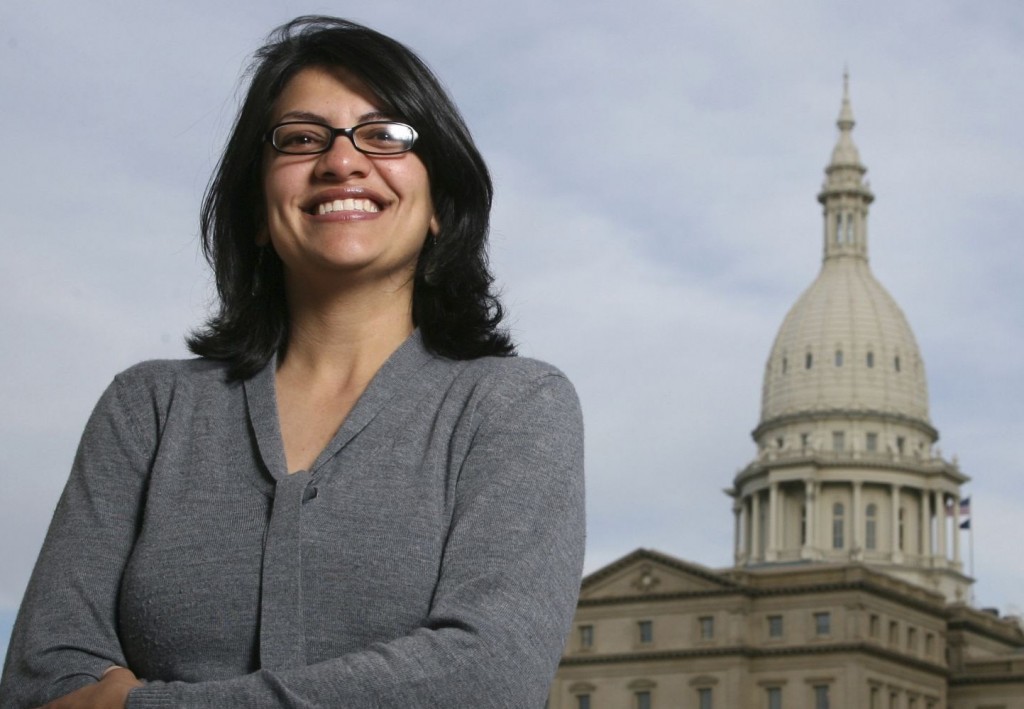The surge of female U.S. legislators, including two Muslims, defies Trump’s bigotry

BY LOU SIFA
With the Democratic Party soon to be in control of the U.S. House of Representatives as a result of Tuesday’s mid-term elections, not only will Donald Trump now be held accountable for the frauds and evils that have defined him all his life, especially since he became president, but also the surge of left-wing women coming to the new congress in January—including two women of the Muslim faith that Trump hates—stands as a powerful rejection of his policies and evil persona.
The wave of more than 100 progressive women-legislators-to-be includes two trailblazer-novice politicians, Ilhan Omar, who came to the United States two decades ago as a refugee and is poised to represent the state of Minnesota, and Rashida Tlaib, a Palestinian-American, who will represent the state of Michigan.

From refugee status to shaping policies in Congress
Sign of the times: Ilham Omar, 37, is the first person born on the African continent to be elected to the U.S. Congress. Come January, she and Rashida Tlaib will join the only other congressman of their faith in Congress, Indiana Democratic Representative Andre Carson, who was re-elected on Tuesday. (Keith Ellison, who did not run this year for Congress, and, instead won the local office of secretary of state, became in 2007 the first Muslim to be elected to the U.S. Congress.)
In her victory speech Tuesday night, Omar stated that in her adoptive state of Minnesota, not only immigrants are welcome, they are also sent to the U.S. Congress.
During the campaign, Omar spoke against Trump’s travel ban against Muslim countries two years ago right after he came to the White House. In an interview broadcast the day following her victory by one of America’s leading television channels, CBS, in the “CBS This morning” segment, the young novice politician made no mystery of her determination to help stop Donald Trump’s propensity for sowing fear among Americans about immigrants in general, and Muslims in particular: I want to “serve as a check on the rhetoric of fear and division.” The future congresswoman also said:
““Congress needs to make sure we are moving the country in a direction that is more hopeful, inclusive and prosperous.”
Omar said she “could not sit on the sidelines” when she realized that America’s promises which she heard about when coming to this country, are not being “extended to everyone.”
Omar, who wears a hijab, was elected to Minnesota House of Representatives in 2016.
Omar’s win of the Minnesota’s 5th district with a staggering 78 percent of the votes over her Republican opponent despite a desperate, smear campaign against her, shows how her message resonates with her constituency, and, indeed, hundreds others throughout America that were won Tuesday by women (and men) who disavow Trump’s rhetoric of division.

Tlaib’s courage to go to jail to oppose Trump’s bigotry
Just as Omar made history by becoming the first person born in Africa to rise to the prestigious U.S. House of Representatives, her future colleague and sister in faith, Rashida Tlaib, won Michigan’s 13th district on Tuesday to become the first woman of Palestinian origin to be elected to the big House. She proudly danced during her victory party Tuesday night wearing the Palestinian flag.
Tlaib, 42, the daughter of Palestinian immigrants, was born in Detroit, Michigan. She already made history in 2008 by becoming the first Muslim woman to serve in the Michigan House of Representatives. A vocal critic of Trump’s policies, this courageous politician was arrested two years ago after disrupting Trump’s speech in Detroit, screaming “our kids deserve better.”
In an interview with one of America’s main television channels, ABC, Tlaib justified her intention to run for Congress for the same reasons Omar ran:
““I ran because of injustices and because of my boys, who are questioning their [Muslim] identity and whether they belong. I’ve never been one to stand on the sidelines.”
Beyond the Muslim faith
Omar and Tlaiab may have made history by becoming the first Muslim women elected to the U.S. Congress, but they did not run on the basis of their faith. They ran on the progressive platform of the Democratic Party in districts that are majority white and non-muslim, as strong advocates of policies that will serve the interests of their constituencies, including the extension of Medicare health coverage for all Americans, increase of the minimum wage to $15, among other things.
The election of these two iconic women who won in predominantly white districts on issues that depart so starkly from Trump’s policies—including his anti-Muslim and anti-immigrant rhetoric, his failed attempt to abolish the Affordable Care Act—is a powerful repudiation of Trump.
The victory of these trailblazers is part of the broader message of repudiation of Trump sent by a diverse wave of progressive men and women across America who are eager to bring to the table their unique experiences to stop a president who has demonstrated time and time again that he stands for nothing but evil.


